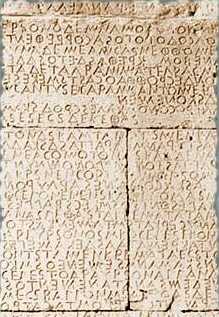Understanding History
GeneralizationNo detail, no person, no event in history has an exact counterpart anywhere else in history. History, in that precise sense, does not repeat. That is the root fact. It is also true (not to anticipate our leaf metaphor from the Comparative History page) that no two white mice are exactly identical.
If you spend time among white mice, you will easily be able to tell one individual mouse from another. This does not in the least prevent the biologist from grouping them all as white mice, and grouping white mice generically with mice of other colors, and then distinguishing all of these, as a group, from rats. With the usual fuzziness, mouse succeeds mouse over generations. With comparable fuzziness, war may succeed war from one human generation to the next. Caution is always in order, and borderline cases may arise through chance or intention, but as a category of understanding, "war" is in practice no less secure than "mouse." You can tell, pretty much, when you have one and when you don't.
What is really difficult in history is generalizing across cultures. European-derived societies have a legal system. Its history, its provisions, and its practical operation are known to the specialists. Do other cultures have something similar? Some yes, some no. Among the Yes group, no two phenomena are exactly alike, and none is exactly like ours. The moment we decide to use "law" for the general category, we lose the precision which our own specialists prize, a loss which is always painful, and we gain in return the possibility of recognizing something about law in society at large, and the chance of discovering that our own system is only one of many possible ones. We see ourselves in perspective. Perspective is not what those in charge of a given culture want; it is however useful to the chronicler of all cultures. There is the decision point. Perspective has its cost, and the comparative historian is the one who thinks the cost is worthwhile. If in making that choice one loses friendships among the lawyers in the neighborhood, well, that is part of the cost. History is not only difficult, it is not free.
If we decide to do it, how do we move toward the possible benefits? Above are some stones from a public building in the Greek city of Gortyn. They contain provisions which sound rather lawlike, such as:
If a mother die leaving children, the father is to be in control of the mother's property, but he shall not sell or mortgage unless the children consent and are of age, but if anyone should otherwise purchase or take on mortgage, the property shall be in the power of the children and the seller or mortgagor shall pay twofold the value to the purchaser or mortgagee, and if there be any other damage besides, the simple value. And if he should marry another woman, the children are to be in control of the mother's property. . .
This goes on for stone after stone. Are these a set of laws, publicly engraved for reference in adjudications, perhaps held in that same building? Or are they the doodlings of the stonemasons? If the latter, we would have to acknowledge an extreme interest of Greek stonemasons in the fine points of inheritance, not to mention the technicalities of returning fugitive slaves. And we would similarly have to acknowledge that whoever wrote the bamboo slips for the tomb furnishings of a Chinese official buried in 0217, in providing (as has been urged in a parallel case) random material simply to fill up the coffin, had indulged a florid imagination as to the penalties for different kinds of robbery. And so on across the whole ancient world. It is probably best to concede that these things, though in many ways they are not like our system, are trying to achieve a somewhat analogous end by roughly comparable means. That is, a law may be recognized as a law, even if written in the Greek language.
And if, as a test of that proposition, we collate early and late materials from the same culture, we can see some tendencies over time, and those tendencies too tend to repeat. For example, lawlike provisions tend over time to become (1) general rather than specific, (2) comprehensive rather than partial, and (3) homonogenized among themselves. Our own system is highly developed in the direction of homogenization; conflicts among different provisions are examined and resolved, so that those referring to them in future will not go in different directions. We can say of these older situations that they have insufficient generality and consistency to count as law, so that only we have law and they don't. Or we can say that law tends over time to develop in the direction of generality and consistency. The latter is the comparative historical approach.
Tendencies of development are thus one thing it is useful to monitor, as we survey lawlike phenomena among ancient civilizations. Categories of competition are another. What exists in societies which seem not to have phenomena recognizable as lawlike? Custom, for one. And in societies which do have such phenomena, how far does custom still govern, and does law emerge at first to adjudicate borderline cases for which custom does not provide, or for which it provides in more than one way? The content of some early sets of lawlike provisions (such as the maxims of Kautilya) suggests just this sort of origin. Quite separately, the evidence also suggests a second origin: in the proclamations of the ruler. In Egypt, the focus of those proclamations is the royal genealogy and its preservation, quite a different sphere from the property disputes which the Hittite and Babylonian provisions extensively address. Does law have two origins, one in high-level proclamation, and another in low-level dispute resolution? Then law itself may be more than one thing, and our legal system may be a hybrid and not a unity. There is still a contrast in our system between criminal and civil law, and the distance between the two seems to be greater as we go further back in time.
This suggests that we have two things here: two mice in the same nest, not one big mouse.
Besides law, are there other formal systems which regulate conduct? China has its nontheological deportment rules, the rules of li. Babylonia has its ritual prescriptions. Mediaeval Europe has not only its canon law, but its dual court and dual citizenship systems, two parallel universes. This is a strange development, arising out of the Christianization of Rome. Still more extreme is the society in which the priest is the only judge. We then have two axes of variation: the secular/sacred dimension, and the socially high/low dimension.
All this is complex, but complexity has its own kind of interest. Does the preacher in an early American town stand somewhat apart from the legal and economic systems that apply to other citizens? Yes, and a like separation can be detected in current American towns. We are a dual society, with two different origins. Becoming more sharply aware of these faultlines and boundaries within a familiar system is among the benefits of looking closely, but also inclusively, at the directions in which other systems move.
It's a little early to tell, but the likelihood is that not all those directions are the same. The implication is that society does not inevitably evolve along one preset track; more than more option is open to it. Some societies, like our own, seem to be simultaneously following more than one track; they are a confluence of several distinct possibilities. If so, then the result of successful generalization will not be to bring all phenomena under the umbrella of the familiar, thus reducing all history to ourselves, but to chart more exactly the space in which the random Brownian movement of a particular social evolution takes place. And to make even the familiar situation strange to us, in ways that are useful to our understanding.
It is adroit generalization that makes this understanding possible: using the terms in such a way as to bring into conjunction variants of one thing, while still separating that cluster from others.
Then we go back to the Trobriand Islanders, and it may be that they too are not as uniform of tendency and homogeneous of consistency as we, and perhaps they, had thought.
Readings
- Louis Gottschalk (ed). Generalization in the Writing of History. Chicago 1963. These essays are not of equal value; they are not even on the same subject. Finley's contribution, which includes a consideration of Roman legal history, contains examples of clear thinking on subjects which invite turgid thinking. Metzger's comment, that the solutions to historical problems sometimes need qualities most typically found outside Departments of History, is also suggestive.
7 Nov 2000 / Contact The Project / Exit to Outline Index Page



